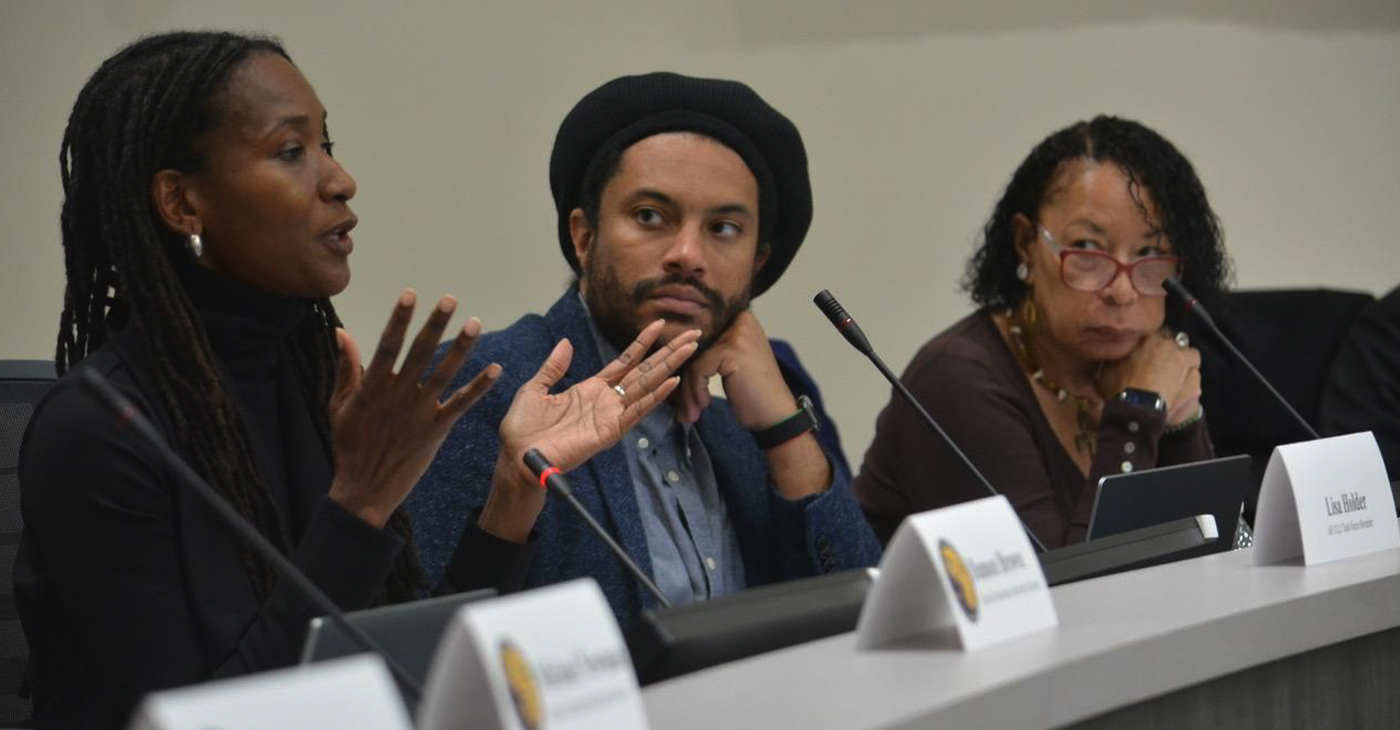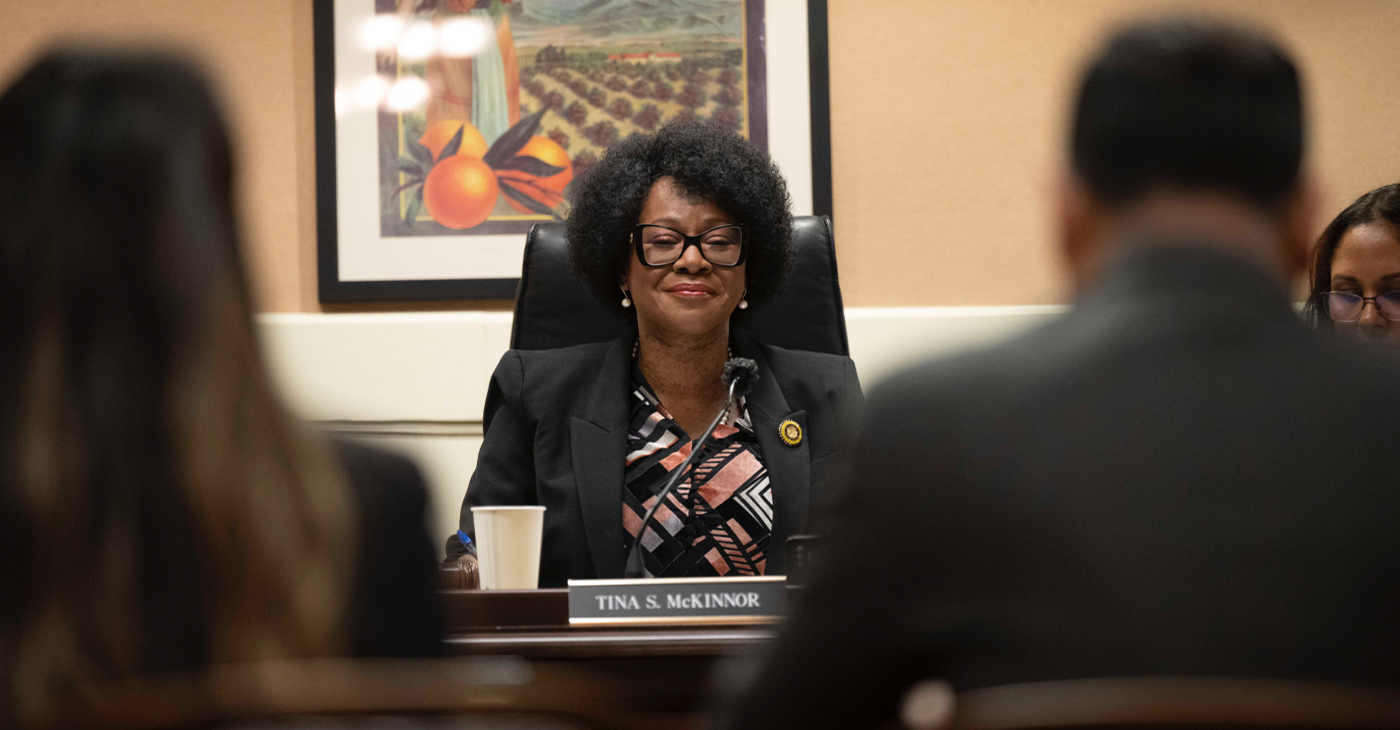California Black Media
Reparations: Experts Compute Hundreds of Billions Owed to Black Californians
Economists advising The California Task Force to Study and Develop Reparations Proposals for African Americans have developed economic formulas that project the reparations owed to Black Californians who are descendants of people enslaved in the United States are likely to exceed $800 billion.

By Antonio Ray Harvey
California Black Media
Economists advising The California Task Force to Study and Develop Reparations Proposals for African Americans have developed economic formulas that project the reparations owed to Black Californians who are descendants of people enslaved in the United States are likely to exceed $800 billion.
Three of five harms were used in the calculations conducted by a five-member panel of economic experts: health, disproportionate housing discrimination, Black mass incarceration and over-policing are “from a long list of harms” the state “is a least partially responsible for,” said Dr. Thomas Craemer, a professor of public policy at the University of Connecticut and one of the experts involved in the assessment.
Craemer spoke last week at the task force’s 14th meeting held in Sacramento on March 29 and 30. The figures also applies to forebears who survived legal segregation, Jim Crow discrimination and other social and economic injustices.
“These are harms for which we thought that we’d have data, that’s one criterion,” said Craemer. “The other is that they are closely related to the actions of the state of California to make our estimates more defensible in the face of challenges that will undoubtedly arrive once the proposal is made public.”
The economic experts’ analysis and final recommendations for the Task Force regarding calculations of reparations and forms of compensation and restitution were presented by Craemer and Dr. William Spriggs.
Spriggs appeared remotely in front of the task force. He is the former chair of the Department of Economics at Howard University. He now serves as chief economist to the AFL-CIO.
The health harm calculations were determined by the annual loss to “Black, non-Hispanic Californians” from health disparities by computing the 7.6 year-life expectancy gap based on the Value of Statistical Life in the United States.
“That is what statisticians use to evaluate how much each individual places value on their life,” Craemer said. “We then divide the value associated with the gap by the average Black, non-Hispanic Californian expectancy of 71 years to obtain an annual estimate of the loss to Black, non-Hispanic Californians from health disparities.”
The experts use the Black non-Hispanic Californian category because they didn’t have a U.S. Census count available for Black Californians who can trace their ancestors back to slavery in the United States.
Black mass incarceration and over-policing calculations were derived from how many Black, non-Hispanic Californians were arrested for drug felonies above the population percentage during the “War on Drugs” from 1970 to 2020.
It was multiplied by the average prison term for drug offenses and by the average annual California State employee wages to arrive at the estimated total owed to Black Californians who qualify for reparation payments.
Housing discrimination was determined by calculating the average of the Black non-Hispanic Californian wage gap for 1930, 1980, 2019. The amount gave the experts the wealth disparity from all forms of housing discrimination, Craemer said.
“I should mention that what we are estimating is not reparations. What we are estimating are losses to the African American descendants of slaves in the United States,” Craemer said. “Our calculations could be used to come up with determinations of reparations but it’s not necessarily identical. The task force can go above and beyond because how some losses are framed (is) difficult to estimate. (Such as) pain and suffering.”
The last two atrocities – unjust property taken by eminent domain and devaluation of Black businesses — are not readily available in the calculation model because of lack of data, Craemer said. The 1980 amount minus the 1930 amount provides an estimate of the effect of redlining only.
Task Force chairperson and Los Angeles attorney Kamilah V. Moore said some published news headlines have put out misinformed information about the experts’ final calculations.
“The task force has yet to determine a final amount,” Moore said.
The numbers are not concrete, leaving room for the members of the task force to evaluate, modify, or eliminate any of the experts’ findings. Spriggs said the experts are still in “deliberations.”
“I think it’s improper to prejudge what precise number we may recommend, but we’re only giving you expert advice on these specific harms. The task force has full latitude to ignore it, to add it, or take into consideration addressing tangible harms,” Spriggs added.
Business
Black Business Summit Focuses on Equity, Access and Data
The California African American Chamber of Commerce hosted its second annual “State of the California African American Economy Summit,” with the aim of bolstering Black economic influence through education and fellowship. Held Jan. 24 to Jan. 25 at the Westin Los Angeles Airport Hotel, the convention brought together some of the most influential Black business leaders, policy makers and economic thinkers in the state. The discussions focused on a wide range of economic topics pertinent to California’s African American business community, including policy, government contracts, and equity, and more.

By Solomon O. Smith, California Black Media
The California African American Chamber of Commerce hosted its second annual “State of the California African American Economy Summit,” with the aim of bolstering Black economic influence through education and fellowship.
Held Jan. 24 to Jan. 25 at the Westin Los Angeles Airport Hotel, the convention brought together some of the most influential Black business leaders, policy makers and economic thinkers in the state. The discussions focused on a wide range of economic topics pertinent to California’s African American business community, including policy, government contracts, and equity, and more.
Toks Omishakin, Secretary of the California State Transportation Agency (CALSTA) was a guest at the event. He told attendees about his department’s efforts to increase access for Black business owners.
“One thing I’m taking away from this for sure is we’re going to have to do a better job of connecting through your chambers of all these opportunities of billions of dollars that are coming down the pike. I’m honestly disappointed that people don’t know, so we’ll do better,” said Omishakin.
Lueathel Seawood, the president of the African American Chamber of Commerce of San Joaquin County, expressed frustration with obtaining federal contracts for small businesses, and completing the process. She observed that once a small business was certified as DBE, a Disadvantaged Business Enterprises, there was little help getting to the next step.
Omishakin admitted there is more work to be done to help them complete the process and include them in upcoming projects. However, the high-speed rail system expansion by the California High-Speed Rail Authority has set a goal of 30% participation from small businesses — only 10 percent is set aside for DBE.
The importance of Diversity, Equity and Inclusion (DEI) in economics was reinforced during the “State of the California Economy” talk led by author and economist Julianne Malveaux, and Anthony Asadullah Samad, Executive Director of the Mervyn Dymally African American Political and Economic Institute (MDAAPEI) at California State University, Dominguez Hills.
Assaults on DEI disproportionately affect women of color and Black women, according to Malveaux. When asked what role the loss of DEI might serve in economics, she suggested a more sinister purpose.
“The genesis of all this is anti-blackness. So, your question about how this fits into the economy is economic exclusion, that essentially has been promoted as public policy,” said Malveaux.
The most anticipated speaker at the event was Janice Bryant Howroyd known affectionately to her peers as “JBH.” She is one of the first Black women to run and own a multi-billion-dollar company. Her company ActOne Group, is one of the largest, and most recognized, hiring, staffing and human resources firms in the world. She is the author of “Acting Up” and has a profile on Forbes.
Chairman of the board of directors of the California African American Chamber of Commerce, Timothy Alan Simon, a lawyer and the first Black Appointments Secretary in the Office of the Governor of California, moderated. They discussed the state of Black entrepreneurship in the country and Howroyd gave advice to other business owners.
“We look to inspire and educate,” said Howroyd. “Inspiration is great but when I’ve got people’s attention, I want to teach them something.”
California Black Media
Asm. Tina McKinnor Elected Chair of L.A. Delegation to Legislature
On Jan. 24, the members of the Los Angeles County Delegation (LACD) to the California Legislature elected Assemblymember Tina McKinnor (D-Inglewood) as the group’s chair. McKinnor, who is a member of the California Legislative Black Caucus, will lead the 39-member body, which is comprised of 15 State Senators and 24 State Assemblymembers representing various areas of Los Angeles County.

By California Black Media
On Jan. 24, the members of the Los Angeles County Delegation (LACD) to the California Legislature elected Assemblymember Tina McKinnor (D-Inglewood) as the group’s chair.
McKinnor, who is a member of the California Legislative Black Caucus, will lead the 39-member body, which is comprised of 15 State Senators and 24 State Assemblymembers representing various areas of Los Angeles County.
As LACD chair, McKinnor succeeds Assemblymember Luz Rivas (D-San Fernando Valley).
“I am grateful for the trust legislators from the Los Angeles County Delegation have placed in me to serve as its next Chair,” said McKinnor in a statement.
LACD Vice Chair, Sen. Maria Elena Durazo (D-Los Angeles), said the body, which collectively represents about 10 million people in California’s populous county, is the largest, bi-partisan, and most diverse delegation in the California Legislature.
“Heading into a challenging budget year, the Delegation, and I will be intensely focused on making sure communities throughout Los Angeles County receive the services they need and that we continue our historic investments to address homelessness and the housing affordability crisis in Los Angeles County,” Durazo added.
McKinnor thanked Rivas for her stewardship of the LACD during the last legislative session.
“The Delegation and I are grateful to outgoing Chair, Assemblymember Luz Rivas, for her incredible leadership to the Legislature, the state, and especially the people of Los Angeles County,” said McKinnor.
California Black Media
Anti-Theft Bill with Jail-Time Requirement Gets Wide Ranging Support
Fed up with the alarming frequency of retail theft across California, including smash and grabs, a diverse group of business leaders, law enforcement officials, policymakers and public safety advocates joined their efforts in Sacramento on Jan. 24. Their purpose: to increase public support for Assembly Bill (AB) 1772, a bill that would make jail time mandatory for repeat theft offenders.

By California Black Media
Fed up with the alarming frequency of retail theft across California, including smash and grabs, a diverse group of business leaders, law enforcement officials, policymakers and public safety advocates joined their efforts in Sacramento on Jan. 24.
Their purpose: to increase public support for Assembly Bill (AB) 1772, a bill that would make jail time mandatory for repeat theft offenders.
Co-authored by Assemblymembers James C. Ramos (D-San Bernardino), Avelino Valencia (D-Anaheim) and Devon Mathis (R-Tulare), AB 1772 would require jail time “of one to three years for theft crimes depending upon the circumstances.
“Offenses would include grand theft, theft from an elder or dependent adult, theft or unauthorized use of a vehicle, burglary, carjacking, robbery, receiving stolen property, shoplifting or mail theft,” the bill language reads.
Ramos said the need to act is urgent.
“It’s time for us to reverse the spikes in theft crimes since the pandemic. Our law enforcement members and district attorneys need additional tools such as AB 1772. We must reverse the trend before the problem grows worse. Last year I requested a state audit of the impact of Prop 47 on Riverside and San Bernardino counties,” said Ramos.
Prop 47 is the California initiative, approved by voters in 2014, that reclassified some felonies to misdemeanors and raised the minimum amount for most misdemeanor thefts from $400 to $950.
According to a Public Policy Institute of California (PPIC) report, the rate of occurrence of petty crimes like shoplifting and commercial burglaries have increased by double digits over the last four years.
In Orange County alone, commercial burglaries have spiked by 54%.
“Our communities are experiencing an increase in retail crime and deserve appropriate action from their legislators,” Valencia said.
San Bernardino County Sheriff Shannon Dicus thanked Ramos.
“This bill, designed to impose stricter penalties on serial retail theft suspects, responds urgently to the escalating consequences of shoplifting and related crimes on our communities,” he said.
AB 1772 supporters who spoke at the gathering included Sacramento Sheriff Jim Cooper and San Bernardino Chief of Police Darren Goodman. Listed as supporters are the California State Sheriff’s Association, City of Riverside Police Chief Larry Gonzalez and Redlands Chamber of Commerce.
-

 Activism4 weeks ago
Activism4 weeks agoOakland Post: Week of March 27 – April 2, 2024
-

 #NNPA BlackPress4 weeks ago
#NNPA BlackPress4 weeks agoCOMMENTARY: D.C. Crime Bill Fails to Address Root Causes of Violence and Incarceration
-

 #NNPA BlackPress4 weeks ago
#NNPA BlackPress4 weeks agoMayor, City Council President React to May 31 Closing of Birmingham-Southern College
-

 #NNPA BlackPress4 weeks ago
#NNPA BlackPress4 weeks agoBeloved Actor and Activist Louis Cameron Gossett Jr. Dies at 87
-

 Community1 week ago
Community1 week agoFinancial Assistance Bill for Descendants of Enslaved Persons to Help Them Purchase, Own, or Maintain a Home
-

 Activism3 weeks ago
Activism3 weeks agoOakland Post: Week of April 3 – 6, 2024
-

 Business1 week ago
Business1 week agoV.P. Kamala Harris: Americans With Criminal Records Will Soon Be Eligible for SBA Loans
-

 Activism2 weeks ago
Activism2 weeks agoOakland Post: Week of April 10 – 16, 2024






















































